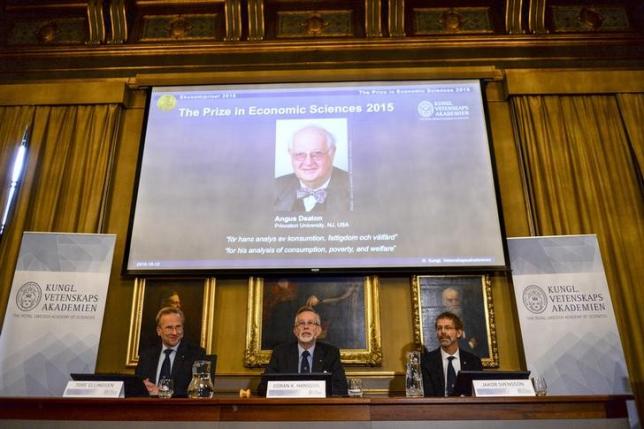British-born economist Angus Deaton has won the 2015 economics Nobel Prize for his work on consumption, poverty and welfare that has helped governments to improve policy through tools such as household surveys and tax changes.
The Royal Swedish Academy of Sciences said the microeconomist's work had been a major influence on policy making, helping for example to determine how different social groups are affected by specific changes in taxation.
"To design economic policy that promotes welfare and reduces poverty, we must first understand individual consumption choices," the award-giving body said in announcing the 8 million Swedish crown ($978,000) prize.
"More than anyone else, Angus Deaton has enhanced this understanding," it said.
Deaton, 69, has spearheaded the use of household survey data in developing countries, especially data on consumption, to measure living standards and poverty, the academy said.
Deaton looks at economic development from the starting point of consumption rather than income, wrote Tyler Cowen, economics professor at George Mason University and blogger.
"Think of Deaton as an economist who looks more closely at what poor households consume to get a better sense of their living standards and possible paths for economic development," Cowen wrote on the blog Marginal Revolution.
"I think of this as a prize about empirics, the importance of economic development, and indirectly a prize about economic history," Cowen wrote.
In his first public comments after winning the Nobel prize, Deaton said that, while extreme poverty has fallen sharply in the last 20 to 30 years and that he expected this trend to continue, he did not want to sound like a "blind optimist".
"While I expect things to get better, you have to keep remembering that we are not out of the woods yet and that for many, many people in the world, things are very bad indeed," Deaton told a press conference by telephone.
"I think the current upwards trends in inequality are very worrying in many contexts around the world," he added.
IMPACT OF TAX CHANGES
In one key work, "The Great Escape; Health, Wealth and the Origins of Inequality", Deaton describes the huge increase in global prosperity in the past two centuries, underpinned by medical and technological advances, but also looks in depth at the inequalities to which that progress has given rise.
Deaton developed a system for estimating how the demand for each good depends on the prices of all goods and on individual incomes, now a standard tool for researchers and in practical policy evaluation the academy said.
"Assume the government wants to change a tax like the VAT on food or gasoline or something, or to change income taxes. How will that affect demand for different commodities? How will that affect welfare for different groups in society?," Mats Persson, a member of the prize awarding committee, told Reuters.
The economics prize, officially called the Sveriges Riksbank Prize in Economic Sciences in Memory of Alfred Nobel, was established in 1968. It was not part of the original group of awards set out in dynamite tycoon Nobel's 1895 will.
Deaton, who was born in Edinburgh and holds both British and U.S. citizenship, is professor of Economics and International Affairs at Princeton University in the United States.
($1 = 8.1803 Swedish crowns)
Like us on Facebook or follow us on Twitter to get the latest news about Vietnam

























































